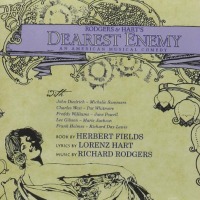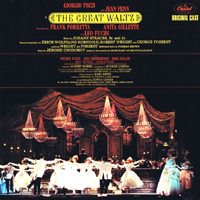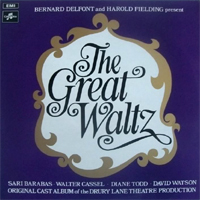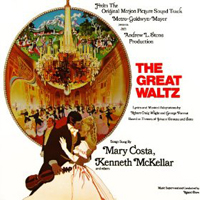 Original Broadway Cast, 2008 (Ghostlight, 2CDs)
Original Broadway Cast, 2008 (Ghostlight, 2CDs)  (4 / 5) Winner of 2008 Tony Awards for Best Musical, Best Original Score, and Best Orchestrations, In the Heights was the first Broadway musical hit to use rap as an essential storytelling component in a score that blends Latin musical styles with hip-hop sensibilities. Set in the Latin-American community of Manhattan’s Washington Heights, the show nestles sentimental stories of first- and second-generation immigrants pursuing their various American dreams and romances amid larger themes concerning notions of home and gentrification. The Grammy Award winning cast album, a two-disc set, preserves the entirety of a dynamic score with both music and lyrics by Lin-Manuel Miranda, who also conceived the show and played the leading role of bodega-owner Usnavi. Fueled by high-octane horns and propulsive percussion, the passion-filled orchestrations by Alex Lacamoire and Bill Sherman support Miranda’s dramatic rapping and the superb singing of the other leads. If you don’t like salsa, merengue, Latin jazz, and hip-hop, you’re out of luck here; but even if the score overall is somewhat lacking in variety, the lengthy individual numbers are built of different-sounding sections. They mix diverse styles, tempi, rhythms, instruments, dynamic levels, and vocal qualities (both spoken and sung), constituting variegated musical journeys unto themselves. Most of the songs also integrate lots of funny, interestingly detailed, and/or emotionally touching dialogue, lending a potent theatricality to what is essentially a pop-music score. Album highlights include “When You’re Home,” a snappy duet performed by Mandy Gonzalez and Christopher Jackson as the show’s young lovers, Nina and Benny; the tear-jerkers “Everything I Know” and “Inutil,” gorgeously sung by Gonzalez and Carlos Gomez, respectively; “Benny’s Dispatch,” a rhythmic treat; and the exciting ensemble number “Carnaval del Barrio.” — Lisa Jo Sagolla
(4 / 5) Winner of 2008 Tony Awards for Best Musical, Best Original Score, and Best Orchestrations, In the Heights was the first Broadway musical hit to use rap as an essential storytelling component in a score that blends Latin musical styles with hip-hop sensibilities. Set in the Latin-American community of Manhattan’s Washington Heights, the show nestles sentimental stories of first- and second-generation immigrants pursuing their various American dreams and romances amid larger themes concerning notions of home and gentrification. The Grammy Award winning cast album, a two-disc set, preserves the entirety of a dynamic score with both music and lyrics by Lin-Manuel Miranda, who also conceived the show and played the leading role of bodega-owner Usnavi. Fueled by high-octane horns and propulsive percussion, the passion-filled orchestrations by Alex Lacamoire and Bill Sherman support Miranda’s dramatic rapping and the superb singing of the other leads. If you don’t like salsa, merengue, Latin jazz, and hip-hop, you’re out of luck here; but even if the score overall is somewhat lacking in variety, the lengthy individual numbers are built of different-sounding sections. They mix diverse styles, tempi, rhythms, instruments, dynamic levels, and vocal qualities (both spoken and sung), constituting variegated musical journeys unto themselves. Most of the songs also integrate lots of funny, interestingly detailed, and/or emotionally touching dialogue, lending a potent theatricality to what is essentially a pop-music score. Album highlights include “When You’re Home,” a snappy duet performed by Mandy Gonzalez and Christopher Jackson as the show’s young lovers, Nina and Benny; the tear-jerkers “Everything I Know” and “Inutil,” gorgeously sung by Gonzalez and Carlos Gomez, respectively; “Benny’s Dispatch,” a rhythmic treat; and the exciting ensemble number “Carnaval del Barrio.” — Lisa Jo Sagolla
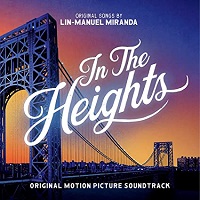 Original Motion Picture Soundtrack, 2021 (Atlantic)
Original Motion Picture Soundtrack, 2021 (Atlantic)  (4 / 5) Retaining the Broadway show’s heart-warming plot lines, likable characters, and Lin-Manuel Miranda’s infectious rap and Latin-pop score, the movie adaptation of In the Heights shifts the focus of the musical’s exploration of “home” from the inter-personal dynamics of a family unit to the larger sense of community shared within their urban neighborhood. The film excises six of the show’s bittersweet, family-related and character-developing solos and duets, and evolves most of the remaining songs into huge production numbers that fill the screen with hordes of dancing bodies. The resulting soundtrack album is, thus, an invigorating collection of mostly upbeat, similarly structured tracks of pop music that may launch quietly but build into full-blown ensemble excitement. Produced by Miranda, Alex Lacamoire, Bill Sherman, and Greg Wells, these percussion-heavy tracks often strike an imperfect balance, volume-wise, between vocals and instrumentals. Unlike the original cast album, with its bright Broadway voices bursting out amid lots of brassy punctuation, here we have thinner pop-style singing competing with louder, fuller orchestrations. One often wishes the words were easier to discern, as the soundtrack CD’s accompanying booklet provides no lyrics. Though shorter than the Broadway recording by about 30 minutes, the soundtrack album contains one newly-written song by Miranda, “Home All Summer.” Featuring the singing of Latin-music superstar Marc Anthony, it exudes a Latin dance-club sensibility as it plays over the film’s closing credits. The soundtrack outshines the Broadway album on two tracks: “The Club,” with electrifying instrumental dance breaks arranged by Oscar Hernández; and “When the Sun Goes Down,” its shimmering orchestrations enriching the ballad’s romantic qualities. Otherwise, one’s choice of the more satisfying album may depend largely on whether one prefers Miranda’s bitingly rhythmic, musically exhilarating rapping or the less-stylized, emotion-laden delivery of Anthony Ramos, who in the film portrays the leading role of Usnavi, created onstage by Miranda. In the climactic “Finale” on the Broadway recording Miranda’s rapping thrills with sharp, spine-tingling musicality, while on the soundtrack, Ramos’s more actorly approach makes one genuinely feel the musical’s celebratory message. — Lisa Jo Sagolla
(4 / 5) Retaining the Broadway show’s heart-warming plot lines, likable characters, and Lin-Manuel Miranda’s infectious rap and Latin-pop score, the movie adaptation of In the Heights shifts the focus of the musical’s exploration of “home” from the inter-personal dynamics of a family unit to the larger sense of community shared within their urban neighborhood. The film excises six of the show’s bittersweet, family-related and character-developing solos and duets, and evolves most of the remaining songs into huge production numbers that fill the screen with hordes of dancing bodies. The resulting soundtrack album is, thus, an invigorating collection of mostly upbeat, similarly structured tracks of pop music that may launch quietly but build into full-blown ensemble excitement. Produced by Miranda, Alex Lacamoire, Bill Sherman, and Greg Wells, these percussion-heavy tracks often strike an imperfect balance, volume-wise, between vocals and instrumentals. Unlike the original cast album, with its bright Broadway voices bursting out amid lots of brassy punctuation, here we have thinner pop-style singing competing with louder, fuller orchestrations. One often wishes the words were easier to discern, as the soundtrack CD’s accompanying booklet provides no lyrics. Though shorter than the Broadway recording by about 30 minutes, the soundtrack album contains one newly-written song by Miranda, “Home All Summer.” Featuring the singing of Latin-music superstar Marc Anthony, it exudes a Latin dance-club sensibility as it plays over the film’s closing credits. The soundtrack outshines the Broadway album on two tracks: “The Club,” with electrifying instrumental dance breaks arranged by Oscar Hernández; and “When the Sun Goes Down,” its shimmering orchestrations enriching the ballad’s romantic qualities. Otherwise, one’s choice of the more satisfying album may depend largely on whether one prefers Miranda’s bitingly rhythmic, musically exhilarating rapping or the less-stylized, emotion-laden delivery of Anthony Ramos, who in the film portrays the leading role of Usnavi, created onstage by Miranda. In the climactic “Finale” on the Broadway recording Miranda’s rapping thrills with sharp, spine-tingling musicality, while on the soundtrack, Ramos’s more actorly approach makes one genuinely feel the musical’s celebratory message. — Lisa Jo Sagolla


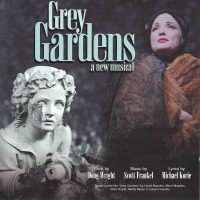
 (3 / 5) Based on Albert and David Maysles’ fascinating 1975 documentary film of the same name, the musical Grey Gardens depicts the dysfunctional relationship between Edith Bouvier Beale and her daughter, Edie, and the shocking squalor into which they had descended by the mid-1970s. The aunt and cousin of Jacqueline Bouvier Kennedy Onassis, the eccentric, elderly Edith and 56-year-old Edie were discovered residing in a filthy Long Island mansion overrun with cats and wild raccoons. While the musical’s second act takes place in 1973 and replicates much of the film’s ghastly content, the first act is a fictionalized confluence of three real-life events that likely impelled the socialites’ downfall: Edith’s father rebuking her, Joe Kennedy, Jr. inexplicably breaking off his engagement to Edie, and Edith’s husband secretly running off to Mexico to obtain a divorce. Though Christine Ebersole gives a tour-de-force performance in the leading dual role (playing Edith in the first act, Edie in the second), and Doug Wright’s penetrating book is buttressed by well-crafted songs by Scott Frankel and Michael Korie, the original Off-Broadway cast album of Grey Gardens can make for difficult listening. Aside from “Another Winter in a Summer Town,” a poetic ballad, and “The Revolutionary Costume for Today,” an amusing illustration of Edie’s idiosyncratic sense of fashion, the score’s primary attractions are its pastiche evocations of once-popular song genres, ranging from minstrelsy to marches, jazz, soft-shoe, gospel, and those beloved waltz-songs commonly used in musicals as emblems of nostalgia. However, the album also preserves much of the songs’ internal and contextualizing dialogue, most of which is argumentative or otherwise unpleasant and therefore compromises the aesthetic appeal of the music. While it is a representative souvenir of the stage production, this is the kind of album likely to sit on one’s shelf. — Lisa Jo Sagolla
(3 / 5) Based on Albert and David Maysles’ fascinating 1975 documentary film of the same name, the musical Grey Gardens depicts the dysfunctional relationship between Edith Bouvier Beale and her daughter, Edie, and the shocking squalor into which they had descended by the mid-1970s. The aunt and cousin of Jacqueline Bouvier Kennedy Onassis, the eccentric, elderly Edith and 56-year-old Edie were discovered residing in a filthy Long Island mansion overrun with cats and wild raccoons. While the musical’s second act takes place in 1973 and replicates much of the film’s ghastly content, the first act is a fictionalized confluence of three real-life events that likely impelled the socialites’ downfall: Edith’s father rebuking her, Joe Kennedy, Jr. inexplicably breaking off his engagement to Edie, and Edith’s husband secretly running off to Mexico to obtain a divorce. Though Christine Ebersole gives a tour-de-force performance in the leading dual role (playing Edith in the first act, Edie in the second), and Doug Wright’s penetrating book is buttressed by well-crafted songs by Scott Frankel and Michael Korie, the original Off-Broadway cast album of Grey Gardens can make for difficult listening. Aside from “Another Winter in a Summer Town,” a poetic ballad, and “The Revolutionary Costume for Today,” an amusing illustration of Edie’s idiosyncratic sense of fashion, the score’s primary attractions are its pastiche evocations of once-popular song genres, ranging from minstrelsy to marches, jazz, soft-shoe, gospel, and those beloved waltz-songs commonly used in musicals as emblems of nostalgia. However, the album also preserves much of the songs’ internal and contextualizing dialogue, most of which is argumentative or otherwise unpleasant and therefore compromises the aesthetic appeal of the music. While it is a representative souvenir of the stage production, this is the kind of album likely to sit on one’s shelf. — Lisa Jo Sagolla
 (5 / 5) Upon the opening of the Broadway production of Grey Gardens (and the release of the Broadway cast recording), the creative team deemed it the definitive version of their show and requested the discontinuation of the cast album of the original Off-Broadway production, turning that recording into a collector’s item. Considering the musical’s generally grim story about former First Lady Jackie Kennedy’s peculiar aunt and pitiful cousin, Edith and Edie, who wind up living in sickening seediness, the Broadway album is a surprisingly fun listen. In its revamping, the musical lost four of its least inspired songs and gained three shiny new ones. Whereas the Off-Broadway album opens with a scratchy old recording of Edith singing “Toyland” that gets drowned out by the mother and daughter bickering, the Broadway album launches with the newly written “The Girl Who Has Everything,” an optimistic tune set within a conversation of pleasant reminiscing. The new song “Goin’ Places,” sung by Edie and her boyfriend, Joe Kennedy, Jr. (before he jilts her), substitutes a showy jazz number with upbeat lyrics about Joe’s future for Off-Broadway’s “Better Fall Out of Love,” a downer emphasizing why Joe and Edie aren’t right for each other. While the plodding “Tomorrow’s Woman” from Off-Broadway was simply eliminated, the spirited march “Being Bouvier” was re-constituted as “Marry Well,” changing the song from a cold military man’s boasting to warmer-toned advice for young girls from a concerned grandpa. The album also benefits from sparkling new orchestrations by Bruce Coughlin; the only major casting change made for the Broadway transfer, namely the replacement of Sara Gettelfinger by the superior singer Erin Davie as Edie in the first act; and the trimming of the unsettling dialogue that weighed down the Off-Broadway recording, which makes it easier for us to appreciate the humorous aspects of the story of poor, pathetic Edith and Edie. — L.J.S.
(5 / 5) Upon the opening of the Broadway production of Grey Gardens (and the release of the Broadway cast recording), the creative team deemed it the definitive version of their show and requested the discontinuation of the cast album of the original Off-Broadway production, turning that recording into a collector’s item. Considering the musical’s generally grim story about former First Lady Jackie Kennedy’s peculiar aunt and pitiful cousin, Edith and Edie, who wind up living in sickening seediness, the Broadway album is a surprisingly fun listen. In its revamping, the musical lost four of its least inspired songs and gained three shiny new ones. Whereas the Off-Broadway album opens with a scratchy old recording of Edith singing “Toyland” that gets drowned out by the mother and daughter bickering, the Broadway album launches with the newly written “The Girl Who Has Everything,” an optimistic tune set within a conversation of pleasant reminiscing. The new song “Goin’ Places,” sung by Edie and her boyfriend, Joe Kennedy, Jr. (before he jilts her), substitutes a showy jazz number with upbeat lyrics about Joe’s future for Off-Broadway’s “Better Fall Out of Love,” a downer emphasizing why Joe and Edie aren’t right for each other. While the plodding “Tomorrow’s Woman” from Off-Broadway was simply eliminated, the spirited march “Being Bouvier” was re-constituted as “Marry Well,” changing the song from a cold military man’s boasting to warmer-toned advice for young girls from a concerned grandpa. The album also benefits from sparkling new orchestrations by Bruce Coughlin; the only major casting change made for the Broadway transfer, namely the replacement of Sara Gettelfinger by the superior singer Erin Davie as Edie in the first act; and the trimming of the unsettling dialogue that weighed down the Off-Broadway recording, which makes it easier for us to appreciate the humorous aspects of the story of poor, pathetic Edith and Edie. — L.J.S.


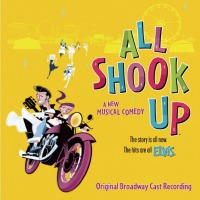
 (2 / 5) A lightweight jukebox musical showcasing 25 songs made famous by Elvis Presley, All Shook Up concerns a motorcycle-riding roustabout who brings romance and rock ‘n’ roll to a dreary Midwestern town in 1955. Flimsily scaffolded by Joe DiPietro’s contrived book, the show contains no original music, thus the value of its cast album lies solely in the degree to which the familiar songs are rendered in new or especially pleasing fashions. Only about a third of the tracks succeed in that respect. The up-tempos fare better than the ballads, most of which are too fast, encumbered by multi-part choral embellishments, and/or robbed of their emotional warmth by strident wailing. The performers don’t try to imitate Elvis, but one almost wishes they could, as it was the velvety beauty of his voice that made Elvis’s renditions of songs like “Love Me Tender” and “Can’t Help Falling in Love” such memorable hits. While none of the cast has a gorgeous enough voice to make those simple melodies as riveting as The King did, Jenn Gambatese (as the roustabout’s love interest, temporarily cross-dressed as a man) gives an impressive interpretation of “A Little Less Conversation,” her bright belt nipping crisply at the rapid-fire lyrics. With arrangements and musical supervision by Stephen Oremus, the album garnishes solo vocals with harmonizing back-up singers and propulsive instrumental breaks, most satisfyingly in “C’mon Everybody,” a “Teddy Bear/Hound Dog” medley, the country-styled “That’s All Right,” and a Motown-flavored “Let Yourself Go.” But the recording’s only true standout numbers are “Jailhouse Rock” and “Burning Love,” classics so intrinsically exciting that they never fail to electrify. — Lisa Jo Sagolla
(2 / 5) A lightweight jukebox musical showcasing 25 songs made famous by Elvis Presley, All Shook Up concerns a motorcycle-riding roustabout who brings romance and rock ‘n’ roll to a dreary Midwestern town in 1955. Flimsily scaffolded by Joe DiPietro’s contrived book, the show contains no original music, thus the value of its cast album lies solely in the degree to which the familiar songs are rendered in new or especially pleasing fashions. Only about a third of the tracks succeed in that respect. The up-tempos fare better than the ballads, most of which are too fast, encumbered by multi-part choral embellishments, and/or robbed of their emotional warmth by strident wailing. The performers don’t try to imitate Elvis, but one almost wishes they could, as it was the velvety beauty of his voice that made Elvis’s renditions of songs like “Love Me Tender” and “Can’t Help Falling in Love” such memorable hits. While none of the cast has a gorgeous enough voice to make those simple melodies as riveting as The King did, Jenn Gambatese (as the roustabout’s love interest, temporarily cross-dressed as a man) gives an impressive interpretation of “A Little Less Conversation,” her bright belt nipping crisply at the rapid-fire lyrics. With arrangements and musical supervision by Stephen Oremus, the album garnishes solo vocals with harmonizing back-up singers and propulsive instrumental breaks, most satisfyingly in “C’mon Everybody,” a “Teddy Bear/Hound Dog” medley, the country-styled “That’s All Right,” and a Motown-flavored “Let Yourself Go.” But the recording’s only true standout numbers are “Jailhouse Rock” and “Burning Love,” classics so intrinsically exciting that they never fail to electrify. — Lisa Jo Sagolla